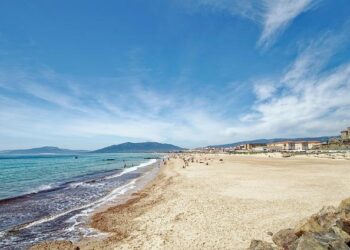Walking past a portrait of former Venezuelan President Hugo Chavez in Caracas, August 2017.
Ueslei Marcelino / reuters
Arguably the single most potent conflict prevention innovation, coming out of Latin America in the past few decades, is guarantor states. Since the 1980s, guarantor states (in partnership with multilateral organizations) have played a central, if discreet, role in shaping peace processes. Far from being passive bystanders, guarantors help jumpstart negotiations, build confidence among parties, manage logistics and resources, provide expertise, and more generally, lend momentum and credibility to peace talks. Occasionally, they also provide solutions to impasses, albeit very quietly and usually only on request. They are distinct from mediators, which act as third parties to actively assist negotiations to end a conflict. Instead, guarantors ensure that the terms of the negotiations and a final agreement are met. They are often unencumbered by the rigid protocols and divisive politics of regional organizations.
Latin American guarantors have a decent record of facilitating negotiations in both inter-state and internal conflicts. In 1998, the treaty ending a century-old dispute between Ecuador and Peru had the support of four guarantors; Argentina, Brazil, Chile, and the United States. Meanwhile, in Colombia, after repeated failures to broker a peace deal with the FARC, four countries—Cuba and Norway as guarantors, and Venezuela and Chile as facilitators—adopted a new approach. As for Colombia’s National Liberation Army (ELN) in Colombia, six guarantor states (Brazil, Chile, Cuba, Ecuador, Norway, and Venezuela) have served as witnesses and sounding boards, gently pushing talks with Bogotá along. Guarantors are no panacea, of course, especially if parties are staunchly opposed to any form of dialogue.
VENEZUELAN SOLUTION
Venezuela is dangerously close to slipping over the precipice. Many of the world’s most intractable armed conflicts were triggered by far less dramatic circumstances than the current crisis in Venezuela. The consequences of a full-blown civil war would be dramatic for the region, with potentially dramatic spillover effects. As hard as it is to imagine, there is still a window of opportunity for preventive diplomacy. The mobilization of guarantor states would be especially palatable for Venezuela, since any negotiations would be nationally-led, as in the case of Colombia. Guarantors could help catalyze and advance dialogues between the Maduro regime and the opposition.
It is time for Latin American solutions to Latin American problems.
Given testy relations between Venezuela and its neighbors, the process will be challenging. Even so, some countries, including Cuba, have accumulated considerable experience in facilitating dialogue through guarantors. It is also worth recalling that Venezuela served as a guarantor state for Colombia’s complex peace process, in spite of extreme political differences between former Venezuelan President Hugo Chavez, Maduro, and the government of Colombian President Manuel Santos. It may be time for Colombia to consider reciprocating, and for Venezuela to consider accepting. And, in spite of political and economic turmoil at home, Brazil could also play a constructive role, whether by hosting dialogues or by continuing to reform its refugee and immigration capabilities.
While the path ahead is uncertain, an exit is still possible. It may involve high-level closed talks facilitated by Cuba and a collection of other countries in the region. Perhaps a trusted regional entity, such as the Community of Latin American and Caribbean States (CELAC) or UNASUR, could play a support role, as Ecuador has suggested. Whatever states and entities come to the table, they can bear witness, host talks, catalyze new thinking, build bridges, and accompany the process. The point is that Latin America is a region rich with experience in resolving its own tensions. It is time for Latin American solutions to Latin American problems.Â
Loading…
Source link : https://www.foreignaffairs.com/articles/venezuela/2017-08-09/how-avoid-venezuelan-civil-war
Author :
Publish date : 2017-08-09 03:00:00
Copyright for syndicated content belongs to the linked Source.












